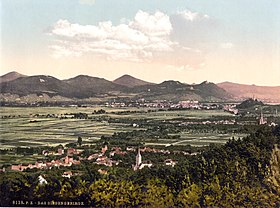Siebengebirge Nature Park
| Seven Hills | |
|---|---|
| Siebengebirge | |

Seven Hills, 1900
|
|
| Highest point | |
| Peak | Großer Ölberg |
| Elevation | 460 m (1,510 ft) |
| Coordinates | 50°40′46″N 07°14′54″E / 50.67944°N 7.24833°ECoordinates: 50°40′46″N 07°14′54″E / 50.67944°N 7.24833°E |
| Geography | |
| Country | Germany |
| State/Province | North Rhine-Westphalia and Rhineland-Palatinate |
| Geology | |
| Orogeny | Volcanic |
| Age of rock | Oligocene |
Seven Hills, or Seven Mountains (German: Siebengebirge), is a Central Uplandish hill range on the east bank of the Middle Rhine, southeast of Bonn, Germany.
The area, located in the municipalities of Bad Honnef and Königswinter, consists of more than 40 hills. The hills are of ancient volcanic origin and came into being between 28 and 15 million years ago. Much of the territory covered by Seven Hills belongs to the Seven Hills Nature Park (Naturpark Siebengebirge), which is under environmental protection.
The highest peak is the Ölberg at 460 metres above sea level. It is a popular tourist destination for hiking, because of its natural environment.
The seven most important hills:
Other hills:
Although the common English name "Seven Hills" is merely the most logical translation of the German name, Siebengebirge, the origins of the latter are disputed. Three theories exist:
...
Wikipedia

